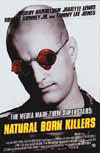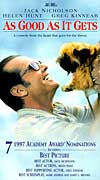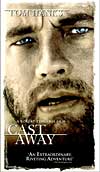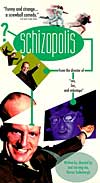|
Solid, Significant Films and Directors of the Decade:
Some of the most established Hollywood filmmakers continued
to make solid films during the decade - Martin Scorsese, Michael Mann,
Robert Altman, Anthony Minghella, Oliver Stone, James Brooks, Brian De
Palma, Robert Zemeckis, Barry Levinson, Francis Ford Coppola, Steven Spielberg,
and others.
Martin Scorsese
For instance, Martin Scorsese directed the following in
the decade before the turn of the century:
- the graphically-violent and compelling GoodFellas
(1990) - a virtuoso adaptation of Nicolas Pileggi's best-selling
book Wiseguy and a true-life account of gangster/FBI informant
Henry Hill (in the witness protection program ultimately) noted for
his statement: "As far back as I can remember, I always wanted
to be a gangster", with fellow gangsters Robert DeNiro and Joe
Pesci ("I'm funny how? Like a clown? I amuse you?")
- Cape Fear (1991), a commercially-successful
remake of director J. Lee Thompson's 1962 thriller film (with Gregory
Peck and Robert Mitchum), with Robert DeNiro as a vengeful, psychopathic
ex-convict stalking defense attorney Nick Nolte
 the
costume drama The Age of Innocence (1993), an adaptation of Edith
Wharton's 1920 novel of passion, hypocrisy, sexual longing and emotional/psychological
repression set in 1870s Victorian New York society, starring Daniel
Day-Lewis and Michelle Pfeiffer as illicit lovers, and Winona Ryder
(who had a Best Supporting Actress nomination) the
costume drama The Age of Innocence (1993), an adaptation of Edith
Wharton's 1920 novel of passion, hypocrisy, sexual longing and emotional/psychological
repression set in 1870s Victorian New York society, starring Daniel
Day-Lewis and Michelle Pfeiffer as illicit lovers, and Winona Ryder
(who had a Best Supporting Actress nomination)- Casino (1995), a Las Vegas-based gangster film
(again from a Pileggi adaptation) set in the 1970s, with favorite stars
Robert DeNiro (as gambling executive Ace) and Joe Pesci (as Mob enforcer
Nicky), and Oscar-nominated Sharon Stone (she won the Golden Globe award
for Best Actress) as a hedonistic, drug-addicted ex-prostitute named
Ginger McKenna
- Kundun (1997), a unique, episodic, historical
epic about the 14th Tibetan Dalai Lama's life, with visually-rich cinematography
by Roger Deakins
- Bringing Out the Dead (1999), a stunning urban
drama about a haunted New York paramedic/ambulance driver (Nicolas Cage);
the film reunited Scorsese with his frequent scriptwriter Paul Schrader,
who scripted Taxi Driver (1976), Raging
Bull (1980), and The Last Temptation of Christ (1988)
- Gangs of New York (2002), a period drama from
Herbert Asbury's book, starring Leonardo DiCaprio, Daniel Day-Lewis,
and Cameron Diaz; nominated for 10 Oscars (without any wins)
 Michael Mann Michael Mann
Screenwriter/producer and director Michael Mann's superb
crime thriller Heat (1995) brought together DeNiro and Pacino (for
the first time) on opposite sides of the law. His next widely-acclaimed
film (with seven Oscar nominations including Best Picture) was The
Insider (1999), the dramatic true-to-life story of a tobacco company
scientist (Russell Crowe) who exposed the corrupt industry for veteran
60 Minutes correspondent Mike Wallace (Christopher Plummer) and
the show's producer (Al Pacino). At the turn of the century, Mann also
directed the biographical sports drama Ali (2001), with Best Actor-nominated
Will Smith portraying the legendary boxing great Cassius Clay/Muhammed
Ali during a ten year period (1964-1974).
Robert Altman
Maverick
director Robert Altman made two satirical studies in the 1990s of modern
day Los Angeles society, both with huge starring casts - one of his trademarks:
 The Player (1992), adapted from scriptwriter
Michael Tolkin's novel - a scathing, dark comedy of the movie business
and a Hollywood studio production executive (Tim Robbins) who murdered
a writer to protect his position; with over four dozen cameo appearances
by stars in the cast The Player (1992), adapted from scriptwriter
Michael Tolkin's novel - a scathing, dark comedy of the movie business
and a Hollywood studio production executive (Tim Robbins) who murdered
a writer to protect his position; with over four dozen cameo appearances
by stars in the cast- Short Cuts (1993), a complex and sprawling
set of eight interlinked stories involving six dysfunctional couples
(over twenty characters) - all Southern California residents, and
their interacting lives
Lesser Altman works followed: Pret-A-Porter (1994),
Kansas City (1996), The Gingerbread Man (1998), and Dr.
T & the Women (2000).
Anthony Minghella
Anthony Minghella wrote the screenplays and directed two
major films in the 90s:
- an acclaimed, three hour long World War II saga/romance
The English Patient (1996) from independent studio Miramax -
a major Academy Award winner (with nine Oscars, including Best Director
and Best Picture), about burned cartographer Count Almasy (Ralph Fiennes)
after a plane crash in WWII who told his life story on his Italian deathbed
to Canadian nurse Hana (Best Supporting Actress-winning Juliette Binoche)
- the Hitchcockian-style psychological thriller The
Talented Mr. Ripley (1999), starring Matt Damon, Gwyneth Paltrow,
and Jude Law
Oliver Stone
After the screen biography The Doors (1991) about
lead singer Jim Morrison (Val Kilmer) and his West Coast rock group (famous
for 'Come on baby, light my fire'), Oliver Stone directed the three-hour
political thriller JFK (1991) to re-examine the 1963 Kennedy assassination
and to attempt to speculate and prove a conspiracy theory and cover-up.
In the film, he 'deconstructed' the Lee Harvey Oswald one-gunman theory
denounced by the government-sanctioned Warren Commission with a counter-theory
involving higher-ups angered by Kennedy's liberalism. Kevin Costner starred
as DA Jim Garrison ("Back, and to the left... back, and to the left...
back, and to the left") and Gary Oldman as assassin Lee Harvey Oswald.
Jack Valenti, the head of the Motion Picture Association (MPA) questioned
the premise of Stone's highly stylized film.
Stone's next effort, Heaven and Earth (1993) concluded
his "Vietnam trilogy" of Platoon (1986) and Born on the
Fourth of July (1989).
 Quentin
Tarantino wrote the story for Oliver Stone's controversial study of mass
murder - Natural Born Killers (1994) - an over-the-top, visceral
satire on the desire of the violence-obsessed, exploitative media in America
to maximize profits, with stars Woody Harrelson and Juliette Lewis as
Mickey and Mallory - two image-conscious serial killers on a psycho road
trip as they are pursued by a sleazy TV reporter (Robert Downey, Jr.).
The energetic film precipitated at least eight 'copycat' murders and violent
incidents by self-professed 'natural born killers,' including two Oklahoma
teens who watched the film repeatedly and then went on a similar shooting
spree. A subsequent multi-million dollar lawsuit in 1995 against director
Stone (and then Time Warner Entertainment), brought by a victim in Louisiana,
was finally dismissed in 2001. The film was originally banned from theatrical
distribution in Ireland. A 2000 Director's Cut version brought back more
than 150 shots removed from the theatrical version prior to release -
severely edited in order to get a R rating instead of an unrated or NC-17
rating. [A year earlier, Juliette Lewis had also appeared in Kalifornia
(1993), an updated, disturbing 90s version of Malick's youth road
movie Badlands (1973).] Quentin
Tarantino wrote the story for Oliver Stone's controversial study of mass
murder - Natural Born Killers (1994) - an over-the-top, visceral
satire on the desire of the violence-obsessed, exploitative media in America
to maximize profits, with stars Woody Harrelson and Juliette Lewis as
Mickey and Mallory - two image-conscious serial killers on a psycho road
trip as they are pursued by a sleazy TV reporter (Robert Downey, Jr.).
The energetic film precipitated at least eight 'copycat' murders and violent
incidents by self-professed 'natural born killers,' including two Oklahoma
teens who watched the film repeatedly and then went on a similar shooting
spree. A subsequent multi-million dollar lawsuit in 1995 against director
Stone (and then Time Warner Entertainment), brought by a victim in Louisiana,
was finally dismissed in 2001. The film was originally banned from theatrical
distribution in Ireland. A 2000 Director's Cut version brought back more
than 150 shots removed from the theatrical version prior to release -
severely edited in order to get a R rating instead of an unrated or NC-17
rating. [A year earlier, Juliette Lewis had also appeared in Kalifornia
(1993), an updated, disturbing 90s version of Malick's youth road
movie Badlands (1973).]
James Brooks and Other Notable Directors and Award-Winners
 James
Brooks' Best Picture generation-gap romance As Good As It Gets (1997)
entertained and won acting Oscars for Jack Nicholson (as an obnoxious
bigot) and Helen Hunt (as a waitress with a heart of gold) from its seven
nominations. Writer/director Mike Figgis' Leaving Las Vegas (1995)
won the Best Actor Oscar for Nicolas Cage as a down-and-out ex-writer
and boozer in love with a sympathetic prostitute (Elisabeth Shue). James
Brooks' Best Picture generation-gap romance As Good As It Gets (1997)
entertained and won acting Oscars for Jack Nicholson (as an obnoxious
bigot) and Helen Hunt (as a waitress with a heart of gold) from its seven
nominations. Writer/director Mike Figgis' Leaving Las Vegas (1995)
won the Best Actor Oscar for Nicolas Cage as a down-and-out ex-writer
and boozer in love with a sympathetic prostitute (Elisabeth Shue).
John Madden's Shakespearean romance Shakespeare in
Love (1998) won top accolades including Best Picture, Best Supporting
Actress (Judi Dench as Queen Elizabeth) and Best Actress (Gwyneth Paltrow
as the Bard's cross-dressing lover Viola). Earlier, Kathy Bates won the
Best Actress Oscar for her bat-swinging/psychopathic fan role in director
Rob Reiner's blackish thriller Misery (1990), another Stephen
King adaptation (by William Goldman). Tom Cruise was the lead in the sports-related
romantic comedy/drama Jerry Maguire (1996) - a sports agent ("Show
me the money") who partnered with football player pariah Rod Tidwell
(Best Supporting Actor-winner Cuba Gooding, Jr.) and single mother Renee
Zellweger ("You had me at hello"). Francis Ford Coppola continued
to make hits, such as his final segment of the trilogy The Godfather,
Part III (1990), Bram Stoker's Dracula (1992), and The Rainmaker
(1997).
Brian De Palma
Brian De Palma, known for his various genres of thrillers
(borrowing techniques from the great master Hitchcock), produced more
hits in the 90s (except for The Bonfire of the Vanities (1990)), including
the following:
 the
provocative Vietnam War film Casualties of War (1989) the
provocative Vietnam War film Casualties of War (1989)- Raising Cain (1992), a shocking psychological
thriller with John Lithgow cast in the dual role of twin brothers
- the crime saga sequel to his own film Scarface (1983)
- Carlito's Way (1993), reteaming DePalma with Al Pacino playing
a former Puerto Rican drug dealer and ex-con
- Mission: Impossible (1996), a big-budget, overly-complicated,
summer action film (a remake of the popular 60s TV series) with Tom
Cruise
- Snake Eyes (1998), a politically-tinged, gripping
thriller with Nicolas Cage as a dishonest Atlantic City homicide detective
who becomes embroiled in a conspiracy theory after the assassination
of a Defense Secretary at a championship boxing match
- Mission to Mars (2000), a sci-fi thriller
Robert Zemeckis
After directing the last in the trilogy, Back to the
Future 3 (1990), the black comedy Death Becomes Her (1992)
with Oscar-winning makeup effects, and Best Picture-winning Forrest
Gump (1994) with Tom Hanks' Best Actor performance, Robert Zemeckis
directed Contact (1997), an emotional sci-fi drama based on a novel
by Carl Sagan, about the serious quest for intelligent life in outer space
by a young scientist (Jodie Foster).  Then
he directed two films released in the same year: Then
he directed two films released in the same year:
- Cast Away (2000), the story of an ill-fated
Federal Express employee (Tom Hanks) who becomes stranded on a remote
island for four years following a plane crash with a volleyball named
"Wilson"; the film reunited Hanks with Zemeckis - their first
film together since 1994
- What Lies Beneath (2000), an old-fashioned supernatural
thriller with a spooky house and an unexpected ending, with stars Michelle
Pfeiffer and Harrison Ford as a married couple
Barry Levinson
 Rain
Man's (1988) director Barry Levinson was responsible for a
number of minor films in the 90s, including Avalon (1990), Bugsy
(1991), Toys (1992), Disclosure (1994), Jimmy Hollywood
(1994), Sleepers (1996), Sphere (1998), and Liberty
Heights (1999). The gangster film Bugsy (1991) starred leading
man Warren Beatty as the larger-than-life visionary mobster Ben 'Bugsy'
Siegel, who opened the first casino hotel in the desert-surrounded town
of Las Vegas - The Flamingo, named after his Hollywood mistress Virginia
"Flamingo" Hill (Annette Bening who soon became his real-life wife). Rain
Man's (1988) director Barry Levinson was responsible for a
number of minor films in the 90s, including Avalon (1990), Bugsy
(1991), Toys (1992), Disclosure (1994), Jimmy Hollywood
(1994), Sleepers (1996), Sphere (1998), and Liberty
Heights (1999). The gangster film Bugsy (1991) starred leading
man Warren Beatty as the larger-than-life visionary mobster Ben 'Bugsy'
Siegel, who opened the first casino hotel in the desert-surrounded town
of Las Vegas - The Flamingo, named after his Hollywood mistress Virginia
"Flamingo" Hill (Annette Bening who soon became his real-life wife).
Coincidentally, Levinson's political satire Wag the
Dog (1997), filmed in only a month and starring Robert DeNiro and
Dustin Hoffman, emerged at the time of President Clinton's sex
scandal with Monica Lewinsky - with a similar plotline of official misconduct,
and the invention of a war in Eastern Europe to distract attention. Here
was another example of Hollywood art presaging real-life.
Steven Spielberg
 Spielberg
contributed a number of major films in this decade, already discussed:
the pair of dinosaur blockbusters Jurassic Park (1993) and The
Lost World: Jurassic Park (1997), and award-winning 'holocaust' epic
Schindler's List (1993). He also directed
the historical drama Amistad (1996) about a mutiny aboard a slave
ship, based on a true story from the 19th century. Producer/director Steven
Spielberg finished the decade with his second WWII epic Saving Private
Ryan (1998) that won five of its eleven Academy Award nominations.
It opened with incredibly brutal, recreated footage of the Omaha Beach
bloodbath and mass slaughter of GIs on June 6, 1944, and told the story
of Captain Miller (Tom Hanks) who was on special assignment to find a
fourth brother in a family where three brothers had already died. Among
others, it received Oscars for Best Director (Spielberg's second) - but
not Best Picture, Best Film Editing, and Best Cinematography (Janusz Kaminski)
for its remarkable hand-held camera work. Spielberg
contributed a number of major films in this decade, already discussed:
the pair of dinosaur blockbusters Jurassic Park (1993) and The
Lost World: Jurassic Park (1997), and award-winning 'holocaust' epic
Schindler's List (1993). He also directed
the historical drama Amistad (1996) about a mutiny aboard a slave
ship, based on a true story from the 19th century. Producer/director Steven
Spielberg finished the decade with his second WWII epic Saving Private
Ryan (1998) that won five of its eleven Academy Award nominations.
It opened with incredibly brutal, recreated footage of the Omaha Beach
bloodbath and mass slaughter of GIs on June 6, 1944, and told the story
of Captain Miller (Tom Hanks) who was on special assignment to find a
fourth brother in a family where three brothers had already died. Among
others, it received Oscars for Best Director (Spielberg's second) - but
not Best Picture, Best Film Editing, and Best Cinematography (Janusz Kaminski)
for its remarkable hand-held camera work.
Steven Soderbergh
And cerebral writer/director Steven Soderbergh solidified
his career, following his Cannes Film Festival's Palm d'Or winner sex,
lies and videotape (1989) with a series of uneven films in this decade:
 the stylistic, black and white Kafka (1991), derived from Kafka's stories, with Jeremy Irons as miserable insurance clerk Franz Kafka the stylistic, black and white Kafka (1991), derived from Kafka's stories, with Jeremy Irons as miserable insurance clerk Franz Kafka- the little-acknowledged, St. Louis Depression-era drama
King of the Hill (1993) starring Jesse Bradford
- The Underneath (1995), a remake of Robert
Siodmak's noir classic Criss Cross (1949)
- the one-man show of Gray's Anatomy (1997), with
Spalding Gray seeking alternative treatment for an eye affliction
- the low-budget, original, experimental film Schizopolis
(1997) - a bizarre series of sketches or gags with director/producer
Soderbergh as the star
- the sexy, hip, mainstream crime caper Out of Sight
(1998) told non-linearly with federal marshal Jennifer Lopez as
the hostage of suave bank robber George Clooney
- The Limey (1999) with legendary actor Terence
Stamp as a vengeful, aging Cockney criminal investigating the 'accidental'
murder of his daughter in Los Angeles
Soderbergh would reach the pinnacle of prominence with
three films early in the next decade:
- Erin Brockovich (2000) with Best Actress-winning
Julia Roberts as the twice-divorced single mom title character, who
successfully prosecuted utility company PGE for poisoning the water
supply in the small town of Hinkley, CA
- the Best Director-winning Traffic (2000), told
in three separate, but interwoven stories
- the remake Ocean's Eleven (2001)
 Film History of the 1990s
Film History of the 1990s
Part 1, Part 2, Part 3, Part 4, Part 5, Part 6

 
|

